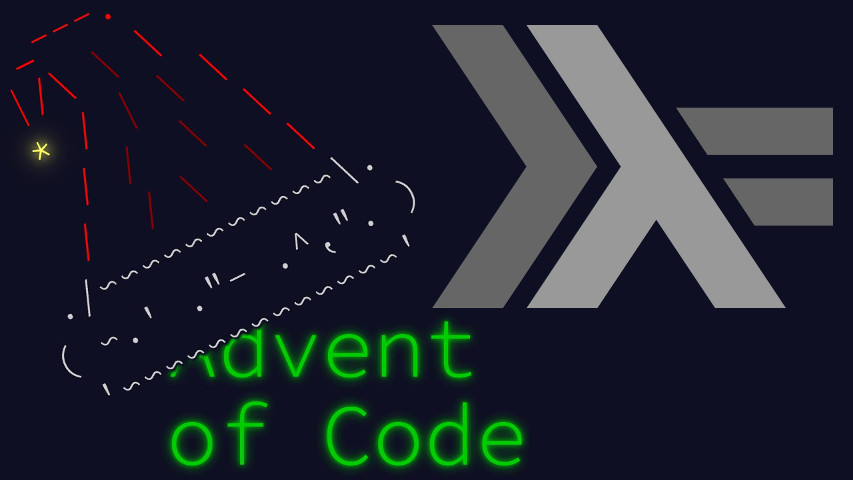Advent of Code is back for a new season! For its first day, “Sonar Sweep”, we’re sweeping the ocean floor with our elven submarine’s sonar, surveying zones of positive slope.
Seems like a perfect case to have fun with Haskell’s point-free notation. Let’s first have a few imports to clear the floor for a literate Haskell post.
import Control.Arrow
import Data.ListGiven two lists as and bs, we can easily
compute the difference between them by zipping:
\as bs -> zipWith (-) bs asNow in this case, the two lists we want to compare are related: one is simply the tail of the other.
\as -> zipWith (-) (tail as) asNotice how that as identifier is now repeated, which is
another word for ugly1. But how could we simplify it
out?
The hack2 is to make use of the Prelude’s provided default Monad instance for function application. Its specialized signature would look as such:
class Monad m where
(>>=) :: m a -> (a -> m b) -> m b
-- substituting ((->) x) for m:
instance Monad ((->) x) where
(>>=) :: (x -> a) -> (a -> (x -> b)) -> (x -> b)This is made to look more complicated than it is by the mixing of
prefix and infix notations for the (->) type operator,
but we can ask GHCi for an expanded signature to clarify:
λ> :t (>>=) @((->) [Int])
(>>=) @((->) [Int])
:: ([Int] -> a) -> (a -> [Int] -> b) -> [Int] -> bNow to keep things simple, a and b are
going to be [Int] as well, yielding:
(>>=) :: ([Int] -> [Int]) -> ([Int] -> [Int] -> [Int]) -> [Int] -> [Int]The two [Int]s at the end are the function we’re trying
to get: the one that takes a stream of integers as an input and returns
the pairwise differences as an output. It’s going to be constructed from
two arguments: the left one that’s the conversion from the base list to
the derived one, in our case tail, and the right one that’s
the combination function, in our case zipWith (-).
Sure enough:
tail >>= zipWith (-) :: [Int] -> [Int]We can then plug it into an interactive-mode pipeline and get the expected result back:
main = interact $ show . length . filter (> 0) . (zipWith (-) =<< tail) . map read . linesI used the =<< flipped version of the operator to
keep the flows going in the same direction overall, it’s confusing
enough as is.
Now for part 2, we still have to perform the filtering and counting, but this time on a sliding window of 3 consecutive depth measurements. A perfect opportunity for more flow programming!
Now there exists a zipWith3 function that would take
three lists, possibly related, and perform some requested actions.
Unfortunately, there isn’t a three-way sum function to plug it in
without requiring abusive point-freeness.
What keeps things simple, on the other hand, is to go directly for summing over a generic list, that will just happen to always have length three. We can pipe components as such:
part1 = length . filter (> 0) . (zipWith (-) =<< tail)
part2 =
tails >>> -- the list of tails of the input
take 3 >>> -- restricted to the first three
transpose >>> -- 3 lists of depths -> list of [3 depths]
map sum >>> -- sum per window
part1 -- and count as beforeThis is fine, and apart from the chosen piping direction, is how I got my second star.
But wait! If I forget my answers and want to solve both parts again,
I have part1 mentioned twice in my code! This can’t do!
Let’s first isolate the computation of part 2 proper:
part2proper = map sum . transpose . take 3 . tailsThen we’d like to solve it “elegantly” by using the same hack as for part 1. But it doesn’t appear to apply here, where it’s the function that’s duplicated instead of its input. Or could it?
twoParts :: [Int] -> (Int,Int)
twoParts = (part1 &&& part1 . part2proper)
= (&&&) part1 (part1 . part2proper)
= flip (&&&) (part1 . part2proper) part1
= (flip (&&&) =<< (. part2proper)) part1But wait!
- What am I flipping
&&&for? I can remember the part 2 answer comes before part 1’s, right? - Why am I defining anything other than
main? Defining a function and then calling is two uses of an identifier; such a waste…
So cleaning it all up:
main = interact $ show . ((&&&) =<< (. map sum . transpose . take 3 . tails))
(length . filter (> 0) . (zipWith (-) =<< tail)) .
map read . linesWho doesn’t like compact code? Point-free to the point of pointlessness. Or to spin it in a more positive light: demonstrating the true power of first-class functions.
This concludes today’s solution. Can’t wait for day 2.



